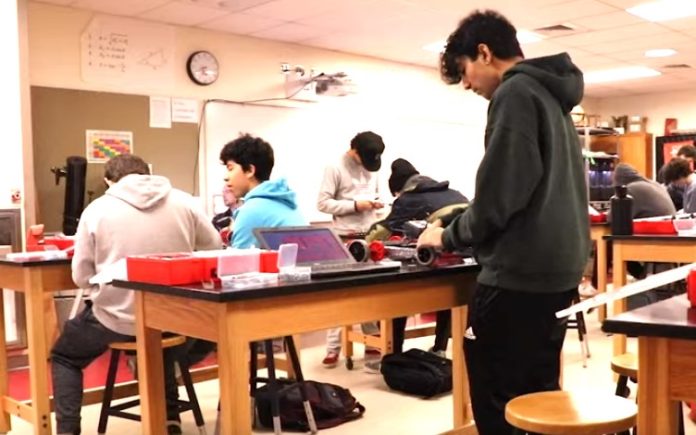
The North Attleborough High School launched its Innovations Pathways in advanced engineering almost a year ago, and students say it’s a success.
The program-which gives students an experience in a specific high-demand industry through coursework and internships at local employers-has become very popular, with two senior students saying their experience was, in their words, “phenomenal.”
NAHS senior Aprameya Pandit said he enjoys the hands-on approach Innovation Pathways provides. He said he’s been able to work with robotics, mathematics and technology in an environment not typically provided by regular classes.
“I saw it as a great opportunity to broaden my horizons,” Pandit said about the classes. “After high school, I want to be an air space engineer, so I learned a lot of things that I never would have learned in other classes.”
The other senior, Silas Brooks-Hedstrom, said his experience in advanced engineering was different than his other classes. He liked how the curriculum gave more agency to the students to apply what they have learned on different projects—such as an operational robotic vehicle.
“I’m joining the international business programs at Brandeis University,” Brooks-Hedstrom said. “I’m going to major in computer science.”
State Rep. Adam Scanlon of North Attleborough expressed his support for the administration’s commitment to funding innovation pathways. Scanlon said that he along with other lawmakers created the line item in the 2021 budget to help fund the program.
“We are excited about the Governor’s proposal to again greatly expand the innovation pathways program,” he said. “We need to invest in career and technical forms of education to ensure we have the strongest and most diverse workforce in the country. It’s important to bring this funding right back to Bristol county.”
Stacia Williams, the program’s science curriculum leader, said this year’s class was so successful that the school is recruiting more students next year to participate.
Innovation Pathways began in 2017 under the administration of then-Governor Charlie Baker.
In the program, students earn college credits at no cost and gain insight as to whether the field is something they want to pursue.
Industries include manufacturing, information technology, environmental and life sciences, health care and social assistance, and business and finance.
Across the Commonwealth, 26 high schools have designated Innovation Pathways, totaling 61 different programs.
Kevin Harker, the program’s transition specialist, said it offers students the chance to eventually be part of the Commonwealth’s workforce.
“Workers in advanced manufacturing are around 55 years old,” Harker said. “The concern is that we don’t have enough qualified people moving up to fill those positions.”
In their fiscal year 2024 budget, Governor Maura Healey and Lt. Governor Kim Driscoll are seeking more spending on Innovation Pathways to address workforce shortages throughout the state. Healey filed a bill titled H.1, which proposes $46.9 million for Early College and Innovation Pathways.
“Our administration is committed to providing more equitable education and career pathways, which will expand opportunity for all and strengthen our economy,” Driscoll said in a statement. “Community colleges, vocational and technical schools, apprenticeship programs, and early college all provide meaningful opportunities for students to prepare for future careers and set themselves up for success.”
